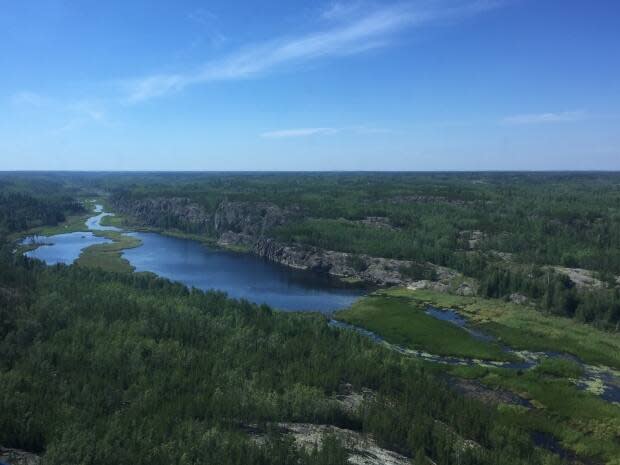N.W.T. remote tourism operators can host out-of-territory visitors this summer. Here's how it works

Remote tourism operators in the Northwest Territories can now host out-of-territory visitors this summer.
Officials announced the change on Wednesday during a COVID-19 update. They said operators can apply to host the visitors by creating a remote tourism COVID-19 operations plan and if approved and in place, clients will be allowed to self-isolate on-site at the remote tourism location, instead of in one of the N.W.T.'s isolation hubs.
But, there are some strict rules in place for this to happen.
Gord Gin, owner and operator of Yellow Dog Lodge, is among the remote tourism operators who worked with NWT Tourism and the Office of the Chief Public Health Officer to get to this point. He said he put in a pilot application back in March.
"There is a lengthy process that you have to go through to apply to be allowed to host domestic guests from outside the N.W.T.," Gin said.
But, he says this update, as long as his plan is accepted by the territory, will make a difference to his bottom line, even if just a small one.
"It's not 100 per cent because our revenue came from outside of Canada as well, but at least it helps ... to keep us afloat for another year," he said, adding domestic tourism makes up only about 20 per cent of his business.
So what are the rules? Here's a breakdown, plus things to know as a resident.
Getting in
For one, visitors will still have to meet existing criteria already in place to enter the territory.
For the last year, the territory has only permitted those who have an exemption under public health orders, like returning residents and essential workers, or those who have an exemption under exceptional circumstances to travel within the N.W.T. All others who enter the territory have had to file a self-isolation plan with a travel exemption request.
Now, the same will apply to the out-of-territory clients, but the difference is they will be self-isolating at the remote tourism location instead of an isolation hub. The same rules apply to foreign nationals, so long as they are permitted to travel within Canada under federal rules.
Operators will also have to ensure clients have no or minimal contact with N.W.T. residents or communities.
That means they also can't rely on "commercial accommodations or food services within an N.W.T. community, except while in transit, and following the proper social distancing protocols," according to the territory's question and answer sheet.
For N.W.T.-bound flights, the territory says interactions between out-of-territory clients and residents on flights is in Transport Canada's jurisdiction, but that there are measures in place to reduce the spread of the virus like wearing masks on flights and barring anyone with symptoms from getting on a flight.
Chris Reynolds, president of Air Tindi, says it's not uncommon to keep some passengers away from the general public.
"In the last year, it's very common for … people going to mine sites or exploration sites to bypass Yellowknife entirely. Sometimes they'll get off one airplane and onto another without any interaction at all," he said.
"Arranging for medevacs for COVID from a private site has been pretty commonplace as well. And there's definitely robust procedures in place to make sure it happens with as little interaction with the N.W.T. as possible."

Staying
Once there, all clients and workers have to be self-contained at the remote location. Management of clients and employee interactions from their arrival in the territory until they leave have to be described in detail in their plan.
"The OCPHO will be working with operators to ensure these plans are well understood and followed," the sheet says.
Gin says operators have to prove in their plan that there are facilities available at the location to separate a person who does become symptomatic from staff, as well as other cohort groups that may be there. And, they have to prove there's a way to evacuate severe COVID-19 patients, in the event.
"We don't want to impact the health services that N.W.T. has. So, a lot of this will be a private service to make sure that the COVID[-19] patient is taken care of," Gin said.
Once tourists have completed self-isolation, they may be able to make stops in nearby communities for supplies or services, according to the territory.
Cabin or on the land isolation for residents
The Office of the Chief Public Health Officer has stated that it will also consider allowing residents who travelled outside of N.W.T. to isolate at remote cabins or remote locations.
That won't include N.W.T. campgrounds.
The CPHO office says it will first weigh several factors before permitting this kind of self-isolation.
That includes immunization status, whether the location will allow for symptom checks and whether there's access to healthcare services, if needed.
Not enough planning time
Officials say the change is being announced now to give tourism operators time to work through logistics ahead of accepting clients this summer. This includes submitting their application packages and providing any further information needed for approval of the plan by the Office of the Chief Public Health Officer.
But, Gin says the territory should have made the announcement sooner and says he is disappointed with what he calls a "late start in the process."
"We were hoping to have this process and announcement way back in February so it would give the outfitters and large owners enough chance to finish their planning, contact their existing clients and lineup the summer schedule," he said.
"With this compressed schedule, it's going to be very difficult to contact our guests — some guests have already cancelled for 2021... hopefully, this [announcement] will also attract some new guests."

